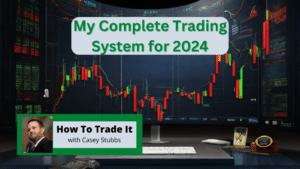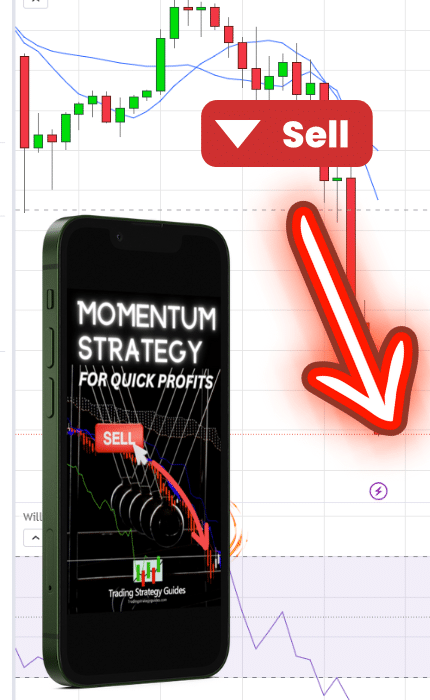The Power of Small Group Trading: Achieving Breakthroughs

Casey Stubbs welcomes listeners to a new episode of the “How to Trade It” podcast, expressing excitement about discussing a key area where traders have been experiencing amazing breakthroughs.
In this episode, you will discover the importance of being part of a small group. We will explore the different mindsets of traders who often work alone and then emphasize the benefits of actually being part of small group trading. You don’t want to miss it!
You can't get help unless you're willing to admit that you have a problem, says trading expert, Casey Stubbs. Join us on this episode of How To Trade It to find out more! #SmallGroupTrading #Accountability #PassTheProp #Coaching Click To Tweet
Subscribe to How To Trade It
Eight Key Points of Small Group Trading:
-
- The Benefit of Community: Casey highlights the supportive and accountable nature of a small group.
- Transparency and Problem Identification: Acknowledging the need to admit and address trading problems honestly, Casey explains the focus on individual issues within a small group.
- Diverse Perspectives: Exploring the advantages of diverse backgrounds, expertise, and experiences within a small group, which foster creativity, innovation, and new ideas.
- Networking and Collaboration: Casey discusses the opportunities for collaboration, partnerships, and networking that arise within a small group.
- Skill Sharing: The benefits of members openly sharing skills and knowledge, leading to personal growth and expanded horizons.
- Peer Learning and Mentoring: Highlighting the value of learning from each other in the small group, both from the mentor and fellow members.
- Increased Confidence and Motivation: How shared goals and witnessing others’ success within the small group can boost confidence and motivation.
- Emotional and Psychological Support: Casey emphasizes the importance of having a safe space within the small group to openly share challenges, fears, and experiences specific to trading.
Casey expresses compassion for traders who have struggled for years and emphasizes the need for a supportive community to share the trading journey.
Click Here to learn more about joining our group coaching!
Benefits of Accountability
Accountability plays a crucial role in trading and offers numerous benefits that can significantly enhance an individual’s success and growth in the financial markets. Firstly, accountability fosters discipline, which is a fundamental trait for any trader. By holding oneself accountable, traders are more likely to adhere to their trading strategies, follow their established risk management rules, and avoid impulsive or emotionally-driven decisions. This disciplined approach helps in maintaining consistency and minimizing costly errors.
Secondly, accountability promotes self-awareness. Traders who take responsibility for their actions and outcomes are more inclined to analyze their performance objectively. They track their trades, review their strategies, and identify patterns or areas of improvement. This self-reflection enables them to learn from both successes and failures, leading to continuous growth and refinement of their trading skills.
Moreover, accountability cultivates a sense of responsibility towards managing one’s financial resources. Traders who are accountable for their trades tend to prioritize risk management, capital preservation, and prudent decision-making. They understand the importance of protecting their trading capital and avoid reckless behavior that could jeopardize their long-term success. This focus on risk control helps traders to navigate volatile markets and withstand inevitable setbacks.
Furthermore, accountability builds trust and credibility in the trading community. Traders who hold themselves accountable develop a reputation for reliability and integrity. They honor their commitments, fulfill their obligations, and maintain transparency in their dealings. This fosters positive relationships with brokers, investors, and other market participants, opening doors to collaborative opportunities and potential partnerships.
Additionally, accountability serves as a source of motivation and resilience. Traders who take ownership of their results are more likely to persist in the face of adversity. They view setbacks as learning experiences rather than failures, and they remain determined to improve their performance. This resilience allows them to bounce back from losses, adapt to changing market conditions, and stay focused on their long-term trading goals.
Lastly, accountability encourages continuous education and self-improvement. Accountable traders recognize the need for ongoing learning and skill development. They actively seek out educational resources, attend seminars or workshops, and engage in discussions with experienced traders. By embracing a growth mindset, they stay updated with market trends, technological advancements, and new trading strategies, which ultimately enhances their competitiveness and profitability.
In conclusion, accountability is a cornerstone of successful trading. It instills discipline, fosters self-awareness, promotes responsible financial management, builds trust, motivates resilience, and encourages continuous learning. Embracing accountability as a trader can pave the way for long-term success, helping individuals navigate the dynamic and challenging landscape of financial markets.
Networking & Collaboration
Here are some reasons why networking and collaboration are advantageous:
- Knowledge and Information Sharing: Networking allows traders to connect with others in the industry, enabling the exchange of valuable insights, strategies, and market information. By engaging in discussions, participating in forums, or attending trading events, traders can gain access to diverse perspectives and learn from the experiences of others. This shared knowledge can help expand one’s understanding of the markets, identify new trading opportunities, and stay updated with the latest trends.
- Learning from Experts: Networking provides an opportunity to connect with seasoned traders and industry experts who have a wealth of knowledge and experience. Building relationships with such individuals allows traders to learn from their successes and failures, gain insights into effective trading techniques, and receive mentorship or guidance. This exposure to experienced professionals can significantly accelerate a trader’s learning curve and provide valuable guidance throughout their trading journey.
- Collaboration on Trading Strategies: Collaboration with other traders can lead to the development of innovative trading strategies and approaches. By working together, traders can combine their unique perspectives, skills, and areas of expertise to create more robust trading strategies. Collaborative efforts can help identify blind spots, mitigate individual biases, and enhance the overall effectiveness of trading approaches. Moreover, collaborating on research, backtesting, and risk management techniques can lead to more comprehensive and refined trading methodologies.
- Access to Resources and Opportunities: Networking opens doors to a wide range of resources and opportunities. Traders who have established connections may gain access to exclusive research reports, proprietary trading tools, or specialized training programs. Additionally, networking can lead to potential partnerships, joint ventures, or investment opportunities. Through collaboration, traders can pool their resources, share costs, and leverage each other’s strengths to capitalize on larger market opportunities that may be beyond their individual capabilities.
- Emotional Support and Accountability: Trading can be a solitary endeavor, and the emotional roller coaster of the markets can be challenging to navigate alone. Networking provides a support system where traders can connect with like-minded individuals who understand the ups and downs of trading. This emotional support helps traders stay motivated, overcome obstacles, and maintain a positive mindset during challenging times. Furthermore, being part of a network can foster a sense of accountability as traders share their goals and progress, creating an environment of mutual encouragement and commitment to success.
Trading Psychology
Also known as trading mindset, trading psychology, refers to the mental and emotional state of a trader that influences their decision-making, behavior, and overall performance in the financial markets. It involves understanding and managing the psychological factors that can impact trading outcomes, such as emotions, biases, beliefs, and attitudes.
A strong trading psychology is essential for consistent and successful trading. Here are some key components and characteristics of a healthy trading psychology:
Emotional Control: Emotions play a significant role in trading. Fear, greed, excitement, and frustration can all influence decision-making and lead to impulsive or irrational actions. A trader with a strong trading psychology maintains emotional control, making decisions based on logic and analysis rather than being swayed by emotions. They understand the importance of managing emotions and have strategies in place to mitigate their impact on trading outcomes.
Discipline and Patience: Successful traders exhibit discipline and patience in their approach. They adhere to their trading plans, follow predetermined rules, and avoid impulsive trades or chasing quick profits. They understand that trading is a long-term game and are willing to wait for high-probability setups before executing trades. This disciplined mindset helps them stay focused and avoid making hasty decisions driven by impatience or a desire for instant gratification.
Risk Management: A sound trading psychology emphasizes the importance of effective risk management. Traders with a healthy mindset prioritize capital preservation and risk control. They calculate and limit their risk per trade, set appropriate stop-loss levels, and avoid taking excessive risks that could potentially wipe out their trading accounts. By managing risk effectively, they protect themselves from significant losses and ensure their longevity in the markets.
Self-Awareness: Self-awareness is a critical aspect of trading psychology. Successful traders continuously assess and evaluate their strengths, weaknesses, and biases. They recognize their emotional triggers and patterns of behavior that may impact their decision-making process. By understanding their own limitations and biases, they can make conscious efforts to mitigate their negative impact and capitalize on their strengths.
Adaptability and Learning Mindset: Markets are dynamic, and successful traders recognize the need to adapt to changing conditions. They approach trading with a learning mindset, constantly seeking to expand their knowledge, refine their strategies, and improve their skills. They embrace failures and losses as opportunities for learning and growth, rather than dwelling on them. This adaptability allows traders to adjust their approaches, adopt new strategies, and stay ahead of market trends.
Positive Mindset and Resilience: Maintaining a positive mindset is crucial in trading. Traders with a healthy trading psychology remain optimistic and resilient, even in the face of setbacks and losses. They view losses as part of the learning process and are not discouraged by temporary setbacks. They stay focused on their long-term goals and maintain confidence in their abilities, which helps them overcome challenges and persist through difficult periods.
Click Here to learn more about joining our group coaching!
Connect With Casey Stubbs
- Website: https://tradingstrategyguides.com/
- Website: https://caseystubbs.com
- Website: https://globalproptrader.com/
- YouTube: https://www.youtube.com/TradingStrategyGuides
- YouTube: https://www.youtube.com/caseystubbs
- Twitter: https://www.twitter.com/caseystubbs
- Facebook: https://www.facebook.com/TradingStrategyGuides
- LinkedIn: https://www.linkedin.com/in/caseystubbs/
Subscribe to How To Trade It
Disclaimer: Trading carries a high level of risk, and may not be suitable for all investors. Before deciding to invest you should carefully consider your investment objectives, level of experience, and risk appetite. The possibility exists that you could sustain a loss of some or all of your initial investment. Therefore, you should not invest money that you cannot afford to lose. You should be aware of all the risks associated with foreign exchange trading, and seek advice from an independent financial advisor if you have any doubts.







